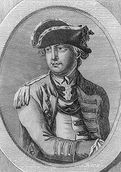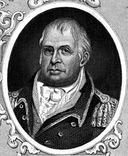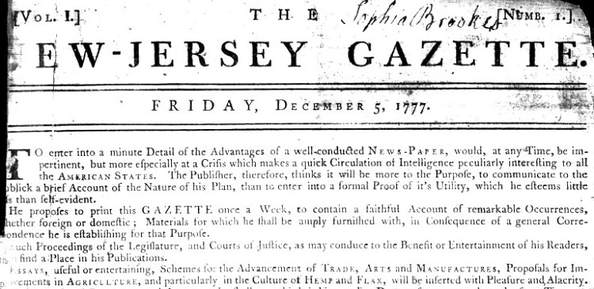* Home
|
-- New Jersey History Timeline - December* January * February * March * April * May * June * July * August * September * October * November * December On December 1 of 1834 In a letter to his father, Edmund Lang of the Class of 1837 at the College of New Jersey (renamed Princeton University in 1896) describes a typical menu in the school's refectory: “Firstly, on ordinary days we have one roll apiece about half the size of a six-penny loaf of bread for breakfast and also coffee. For dinner we have beef or some other meat with potatoes and two apples. For tea we have coffee, bread, and generally cheese or something of the kind, but we have one day, Friday, which we call ‘good dinner day,’ when we have poultry of some kind, applesauce, and pie. One day we had a kind of poultry I had never tasted before and they were peacocks.”
On December 2 of 1776 Continental Army commanded by George Washington begins retreating across the Delaware River from New Jersey to Pennsylvania. On December 3 of 1776 General George Washington, after retreating from the British southwest across New Jersey, writes from Trenton to the Continental Congress to report that he had transported much of the Continental Army’s stores and baggage across the Delaware River to Pennsylvania to keep them from the British. On December 4 of 1816 James Monroe, who had been seriously wounded in the attack on the Hessian barracks in the Battle of Trenton on December 26, 1776, is elected as the fifth President of the United States, defeating Rufus King of the Federalist Party. On December 5 of 1777
New Jersey's first newspaper, The New Jersey Gazette, begins publication.
On December 8 of 1776 After suffering defeats by the British in New York and northern New Jersey, George Washington's retreating Continental Army crosses the Delaware River to Pennsylvania On December 9 of 1914 A fire at Thomas Edison’s Laboratory complex in West Orange caused by an explosion in the film inspection building destroys over half the buildings. Edison and his wife rush from their nearby home and stay until firefighters were able to contain the blaze. On the next day, Edison vows to rebuild the complex. On December 10 of 2019 Six people, including a police detective, are killed in Jersey City in a series of gunfights that began in a cemetery and later spread to a nearby kosher food market. In addition to the police detective, the dead included three people in market and two suspected shooters,The shooting began when the detective approached one of the gunmen at a nearby cemetery in connection with a homicide investigation and was shot dead. On December 11 of 1907 The electric chair is first used for an execution in New Jersey when 34-year old Saverio DiGiovanni of Raritan is put to death at Trenton State Prison after his conviction of murder. The electric chair had become a focus of the rivalry between George Westinghouse over the use of alternating current (AC), the form of electric transmission favored by Westinghouse, and direct current (DC), which was promoted by Thomas Edison. In a series of public demonstrations electrocuting dogs, horses and other animals, Edison sought to undercut his rival Westinghouse by unsuccessfully persuading the public that AC transmission was more dangerous than his preferred DC, which he argued was safer for general use. |
|
On December 12 of 1915
Frank Sinatra is born in Hoboken, the only child of Italian immigrants Antonino Martino "Marty" Sinatra and the former Natalina "Dolly" Garaventa. One of his first groups is "The Hoboken Four," which performs on the Major Bowes Amateur Hour radio program in 1935. He dies at the age of 82 of a heart attack on May 14, 1998 in Los Angeles. |
|

On December 13 of 1776
During the retreat of the Continental Army after its defeats by the British in New York and northern New Jersey, American General Charles Lee leaves his main body of soldiers and is captured by British cavalry at a tavern in Basking Ridge. Two years later, he is exchanged for a British general who was held prisoner, restored to a command and court-martialed for insubordination in failing to obey Washington's orders to attack the British at the Battle of Monmouth on June 28, 1778.
During the retreat of the Continental Army after its defeats by the British in New York and northern New Jersey, American General Charles Lee leaves his main body of soldiers and is captured by British cavalry at a tavern in Basking Ridge. Two years later, he is exchanged for a British general who was held prisoner, restored to a command and court-martialed for insubordination in failing to obey Washington's orders to attack the British at the Battle of Monmouth on June 28, 1778.

On December 14 of 1776
As the main Continental Army under George Washington continues its retreat from New Jersey to Pennsylvania, American General William Heath is directed to harass the British and slow their pursuit of Washington. His soldiers surprise the British at Hackensack, taking sixty prisoners, and further south two hundred of his men attack Bergen Woods, capturing twenty three colonials who were forming a Loyalist regiment.
As the main Continental Army under George Washington continues its retreat from New Jersey to Pennsylvania, American General William Heath is directed to harass the British and slow their pursuit of Washington. His soldiers surprise the British at Hackensack, taking sixty prisoners, and further south two hundred of his men attack Bergen Woods, capturing twenty three colonials who were forming a Loyalist regiment.
On December 15 of 1950
The first section of the Port Authority Bus Terminal opens, serving as the principal gateway in Manhattan for bus traffic to and from New Jersey
The first section of the Port Authority Bus Terminal opens, serving as the principal gateway in Manhattan for bus traffic to and from New Jersey
On December 16 of 1970
The first New Jersey Lottery ticket is sold to Governor William T. Cahill as weekly 50-cent game tickets went on sale at 2,000 locations throughout the state. New Jersey became the third state to begin lottery sales, behind New Hampshire and New York.
The first New Jersey Lottery ticket is sold to Governor William T. Cahill as weekly 50-cent game tickets went on sale at 2,000 locations throughout the state. New Jersey became the third state to begin lottery sales, behind New Hampshire and New York.
On December 17 of 1903
The brothers Orville and Wilbur Wright pilot the first powered airplane 20 feet above a beach at Kitty Hawk in North Carolina. In 1919, the Wright Aeronautical Corporation, the successor to their original corporation, is formed headquartered in New Jersey, with its principal manufacturing complex in Paterson. In 1929, the company would merge with the Curtiss Aeroplane and Motor Company to become the Curtiss-Wright Corporation.
The brothers Orville and Wilbur Wright pilot the first powered airplane 20 feet above a beach at Kitty Hawk in North Carolina. In 1919, the Wright Aeronautical Corporation, the successor to their original corporation, is formed headquartered in New Jersey, with its principal manufacturing complex in Paterson. In 1929, the company would merge with the Curtiss Aeroplane and Motor Company to become the Curtiss-Wright Corporation.
On December 18 of 1787
New Jersey becomes the third state, after Delaware and Pennsylvania, to ratify the US Constitution. When New Hampshire becomes the ninth state to ratify on June 21, 1788, the Constitution is declared to be in effect.
New Jersey becomes the third state, after Delaware and Pennsylvania, to ratify the US Constitution. When New Hampshire becomes the ninth state to ratify on June 21, 1788, the Constitution is declared to be in effect.
On December 19 of 1964
The first indoor collegiate football game was played in the Atlantic City Convention Hall for the Liberty Bowl, with the University of Utah defeating the University of West Virginia by a score of 32 to 6 before a crowd announced as just over 6,200.
The first indoor collegiate football game was played in the Atlantic City Convention Hall for the Liberty Bowl, with the University of Utah defeating the University of West Virginia by a score of 32 to 6 before a crowd announced as just over 6,200.
On December 20 of 1789
New Jersey becomes the first state to ratify the Bill of Rights.
New Jersey becomes the first state to ratify the Bill of Rights.
On December 21 of 1918
Hobey Baker, a graduate of the Class of 1914 at Princeton University and considered one of its most outstanding athletes in hockey and football, is fatally injured when he crashes in France while piloting a repaired plane as a captain in the US Army Air Service.
Hobey Baker, a graduate of the Class of 1914 at Princeton University and considered one of its most outstanding athletes in hockey and football, is fatally injured when he crashes in France while piloting a repaired plane as a captain in the US Army Air Service.
|
On December 22 of 1937
The Lincoln Tunnel opens to traffic connecting New York City and New Jersey. It was built under the Hudson River with a construction cost of $85 million and charged an initial toll for each passenger car of fifty cents. |
|
On December 23 of 1947
AT&T scientists John Bardeen and Walter Brattain, with support from colleague William Shockley, demonstrate their invention of the transistor at Bell Laboratories in Murray Hill.
AT&T scientists John Bardeen and Walter Brattain, with support from colleague William Shockley, demonstrate their invention of the transistor at Bell Laboratories in Murray Hill.
On December 24 of 1784
The Continental Congress concludes its session meeting at the French Arms Tavern in Trenton, which had begun on November 1, passing a resolution to adjourn "to meet at the city of New York, on the eleventh Day of January following..."
The Continental Congress concludes its session meeting at the French Arms Tavern in Trenton, which had begun on November 1, passing a resolution to adjourn "to meet at the city of New York, on the eleventh Day of January following..."
On December 25 of 1776
George Washington orders the Continental Army to leave their winter encampment in Pennsylvania and cross the Delaware River to launch a surprise attack the next morning on the Hessian forces in Trenton.
George Washington orders the Continental Army to leave their winter encampment in Pennsylvania and cross the Delaware River to launch a surprise attack the next morning on the Hessian forces in Trenton.
|
On December 26 of 1776
After crossing the Delaware River from Pennsylvania, Washington's forces attack the Hessians in their barracks in Trenton. The Hessians have 22 killed in action, 83 wounded, and 896 captured–including the wounded. Washington's army suffers only two deaths from bare feet causing frostbite and five wounded in battle, including a near-fatal wound to future president James Monroe. |
|
On December 27 of 1900
President Abraham Lincoln writes a letter thanking the College of New Jersey (renamed 1896 as Princeton University) for awarding him an honorary degree.
President Abraham Lincoln writes a letter thanking the College of New Jersey (renamed 1896 as Princeton University) for awarding him an honorary degree.
|
|
On December 28 of 1982
The Battleship USS New Jersey is re-commissioned during the Reagan Administration. In the next year, it sees action in the Mediterranean firing on Syrian forces battling the Lebanese Army. |
On December 29 of 1926
President Calvin Coolidge addresses the Trenton Historical Society at a dinner commemorating the 150th Anniversary of the two battles of Trenton. In his talk, Coolidge assessed Washington's accomplishments at Trenton: “Washington and his generals are gone. The bloody tracks which their barefoot armies often left on the frozen ground have long since been washed away....But the institutions which they founded, the Government which they established, have not only remained, but have grown in strength and importance and extended their influence throughout the earth. ”
President Calvin Coolidge addresses the Trenton Historical Society at a dinner commemorating the 150th Anniversary of the two battles of Trenton. In his talk, Coolidge assessed Washington's accomplishments at Trenton: “Washington and his generals are gone. The bloody tracks which their barefoot armies often left on the frozen ground have long since been washed away....But the institutions which they founded, the Government which they established, have not only remained, but have grown in strength and importance and extended their influence throughout the earth. ”
On December 30 of 1776
After his victory on the day after Christmas over the Hessians, General George Washington returns from Pennsylvania to Trenton and establishes a defensive position at the Assunpink Creek to confront a British force advancing from Princeton commanded by Lieutenant General Charles Cornwallis.
After his victory on the day after Christmas over the Hessians, General George Washington returns from Pennsylvania to Trenton and establishes a defensive position at the Assunpink Creek to confront a British force advancing from Princeton commanded by Lieutenant General Charles Cornwallis.
On December 31 of 1879
Thomas Edison demonstrates incandescent lighting to the public for the first time by illuminating a street in Menlo Park (now Edison Township), the site of his laboratory.
Thomas Edison demonstrates incandescent lighting to the public for the first time by illuminating a street in Menlo Park (now Edison Township), the site of his laboratory.

